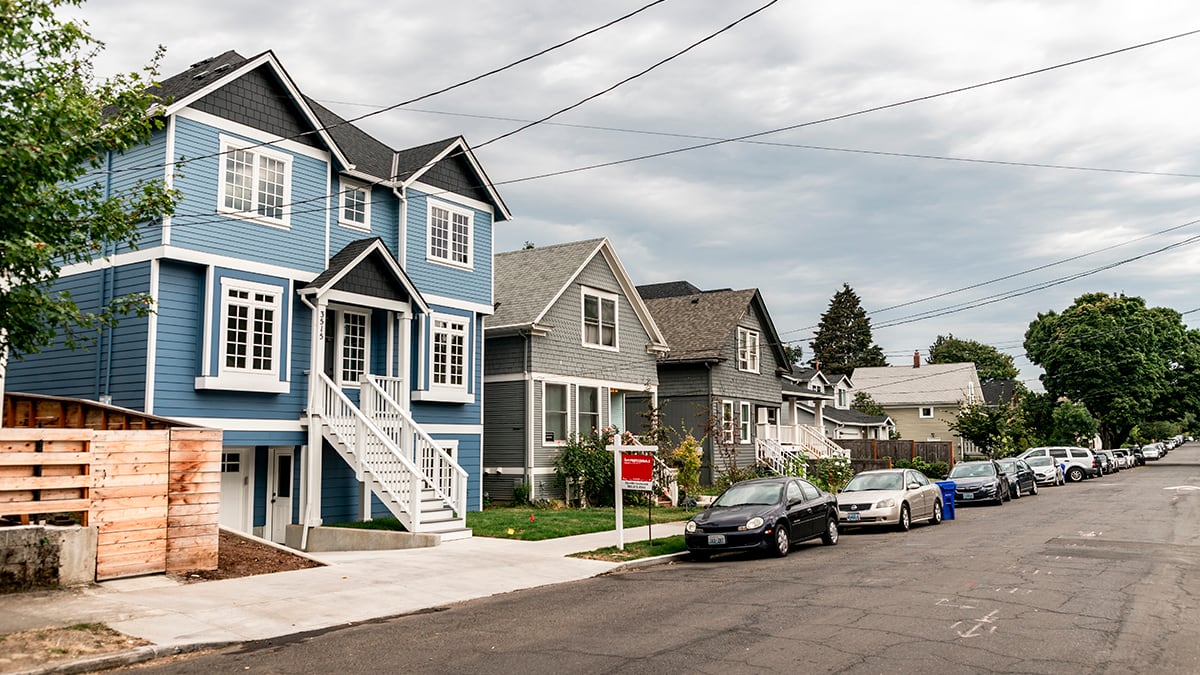Portland's destiny is density.
After nearly six years of debate and delays, the Portland City Council on Wednesday approved a broad rezoning of the city's neighborhoods—a policy that will encourage the construction of garden apartments and triplexes among single-family homes.
The policy will allow up to four homes on nearly every residential lot, and six units if three of them are affordable to low-income families.
Mayor Ted Wheeler joined Commissioners Chloe Eudaly and Jo Ann Hardesty in voting for the new rules. Commissioner Amanda Fritz voted no.
"I am proud to support a policy that creates opportunities for more housing and different kinds of housing," said Wheeler. "I am particularly proud that the proposal offers a significant bonus for affordable housing developers, given the significant need."
What will that look like? While the policy may encourage a revival of single-story, 1930s-style garden apartments built around a courtyard, the rules are written in a way that explicitly encourages "sideways townhouse" homes—essentially duplexes where one unit is stacked atop the other. A developer could fit two of these two-story units on a single lot—or three of them, if the builder made three of the individual units affordable.
As Sightline Institute first noted Tuesday, the new rules will effectively make driveways optional on new construction for the first time since 1973.
The passage of the policy, called the Residential Infill Project, marked a decisive victory for advocates of housing supply and affordability, who argued that the new rules would create homes for low-income people of color, and a bitter defeat for homeowners who believe apartments drive down the value of their property and will lead to a spate of historic homes demolished to make way for McMansions.
The policy first emerged in 2014, but was soon mired in controversy.
Neighborhood associations warned that upzoning would destroy the look and feel of leafy, modest streets by creating incentive for homeowners to sell to developers who would tear down small houses and replace them with gaudy monsters. Advocates for renters feared the plan did too little to ensure low-income Portlanders could remain in their current homes.
The repeated hearings and delays became something of a running gag at City Hall. In the time it took the City Council to modify single-family zoning, the Oregon Legislature effectively banned it.
But the slow process allowed skeptical officials—especially Commissioner Eudaly—time to tweak the policy, creating greater incentives for building affordable units even in upscale neighborhoods.
Eudaly and Hardesty said the final product would begin to rectify decades of economic displacement and racist housing policies that drove people of color out of Portland.
"For over 100 years, exclusionary zoning laws have kept certain types of housing, and therefore certain classes and races of people, out of single-family neighborhoods," Eudaly said as she voted yes. "Simple upzoning will not remedy past harms or guarantee more affordable housing and diverse neighborhoods. That is why I've worked so hard to ensure that we included incentives for affordable housing, commit to developing and implementing anti-displacement measures, and encourage the preservation of existing housing."
As recently as 2018, the policy known as RIP was among the most contentious issues at City Hall. A pandemic and civil unrest over racist policing have made those days seem quaint. And as Michael Andersen, an analyst for Sightline Institute, notes, no candidate for public office ever successfully campaigned on a platform opposing housing density.
"There's no empirical, political reasons for politicians to feel scared of it," Andersen tells WW. "They've just been scared of the 10 to 20 percent of people who feel like it's the worst thing in the world."

